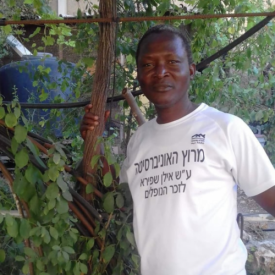
Gehleigbe Bobson Bleh
My message to children around the world: I would like to tell children that they are unique, smart, and creative. They have all the abilities and potential of scientists! They can demonstrate these abilities through play.|
Country: Liberia |
|
If you could send one positive message to children and families/caregivers around the globe at these challenging times, what would it be? Families and caregivers should be mindful of this fact and support children by engaging in play. Through play, we can teach children cognitive, social, and motor skills. We can also teach them to follow the rules and understand health protocols during the COVID-19 pandemic. Finally, parents, caregivers, and governments should provide as much security for young children as possible right now. During the early years, their wellbeing is essential, and the impact of adverse conditions can last into their future.
If you could send one positive message to your colleagues around the globe at these challenging times, what would it be?
What are you learning during these times as an individual and a professional? I have discovered that so much of a child's learning occurs through play. My 12-year-old daughter, an 8th-grade student, does some beautiful drawings in her notebooks. She has been sharing them with me during the lockdown. She also uses scissors to cut cloths and make them into dresses. She is naturally creative; all I have to do is to appreciate and encourage her.
What would you like people to know and understand about your work during the COVID-19 pandemic? We have discovered that even though kids are not going to school, they are actively learning through play. We organized an informal intervention program to help parents work with their children, encourage them, and engage them in playful activities.We ask parents to integrate information about how to prevent the spread of COVID-19 into children's activities. They can play with building blocks, set up the kitchen for pretend cooking, play with local toys, and so on. Parents should encourage their young children to play and engage older children in different forms of play as well. What concerns you the most now, and what concerns you most for the upcoming period? I am also concerned about the health and welfare of children growing up in vulnerable circumstances, homes where parents cannot afford to feed and provide medical care for their children. Recently, there have been alarming incidents of violence perpetrated against young children, especially girls. The wellbeing of children is at stake in my country during this COVID-19. |
